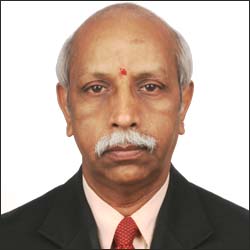Suri Setu Ram turned a financial advisor after one-and-a-half decade of successful career as an engineer
 Mumbai: Hyderabad-based Suri Setu Ram, an engineer and a graduate in personnel management, worked in public and private sector companies for 15 years, both in India and abroad. His overseas stint was in Tanzania for installation and commissioning of a turnkey project involving 21 heavy machines and training of Tanzanian technicians and engineers. Suri even won a commendation from the governments of Tanzania and India for expeditious completion of the project. He also toured Zimbabwe and Dubai on business. He had worked his career with public sector companies where he spent 10 years.
Mumbai: Hyderabad-based Suri Setu Ram, an engineer and a graduate in personnel management, worked in public and private sector companies for 15 years, both in India and abroad. His overseas stint was in Tanzania for installation and commissioning of a turnkey project involving 21 heavy machines and training of Tanzanian technicians and engineers. Suri even won a commendation from the governments of Tanzania and India for expeditious completion of the project. He also toured Zimbabwe and Dubai on business. He had worked his career with public sector companies where he spent 10 years.
Suri says he never got the satisfaction he craved for during his corporate career. That’s what prompted his shift to self-employment in 1985. In 1985, he started his own industrial consulting firm. Two years later in 1987, Suri tried his hand at a completely unrelated profession – insurance selling by floating Sureinvest. After two years in industrial consulting, Suri’s decision to dabble in insurance was just an option to supplement his income from consulting business.
“The entry into insurance was by chance. LIC Development Officer V B Mohan who recruited me told me that three Ts were essential to settle in insurance business. They were telephone, transport and table. Since I possessed all three, I could look forward for instant success - and he was true to a great extent,” recalls Suri.
He then realised insurance was just one of the financial needs of people. This led to Suri starting to sell mutual funds and other equity products. “I started dealing with other financial needs and advising people about their applicability in their situation.” says Suri. This helped him diversify his product offerings and in turn revenues. His performance in mutual fund selling earned him a place in the ICICI Prudential Mutual Fund Chairman's Circle. He was also part of the Million Dollar Round Table in 2002 & 2003 for the volumes he achieved in insurance. He currently holds a Gold status in Reliance Mutual Fund.
Suri says need-based financial planning was always a part of his advice but this business did not have a professional shape or nomenclature at that time.
When the regulator imposed ban on entry loads from August 2009, Suri surprisingly got a call from one of his NRI clients expressing his willingness to pay a fee. But Suri does not charge his old clients a fee. This does not mean Suri does charity.
“I place a poster in my office that urges new clients to pay a fee. He also highlights the relevant paragraph on some mutual fund application forms that advises the client to pay a fee to his advisor,” says Suri.
Suri also makes it a point to get the client to his office instead of visiting the client’s residence or office. “When I write a new business, I encourage the client to visit our office. My office is equipped all the paraphernalia, staff, computers and other gadgets to generate appropriate presentations and reports about their existing investments or policies. I can't have so much of support when I visit them with my laptop. However, I have to visit certain VVIP clients, who can't afford to spare time to visit me. For the routine things such as picking up a document or cheque or obtaining a signature, our errand staff will take care,” explains Suri.
He believes that the entry load ban was a blessing in disguise for financial advisors. Prior to the entry load ban, a number of services rendered to clients, for instance KYC compliance were free of charge. He feels it would now be possible to include this cost in the fee charged to the investor.
He today manages portfolios of around 500 mutual fund clients. He has a team of six professionals to service clients.
Though Suri had not planned his entry into financial advisory business, he is now well-established in the business. He aims to finish CFP this year to have a better understanding of financial planning world.





